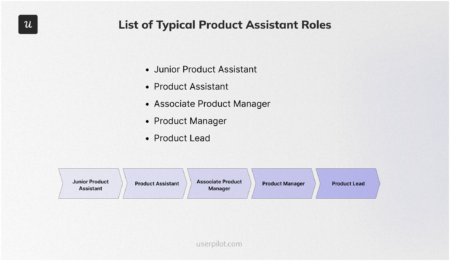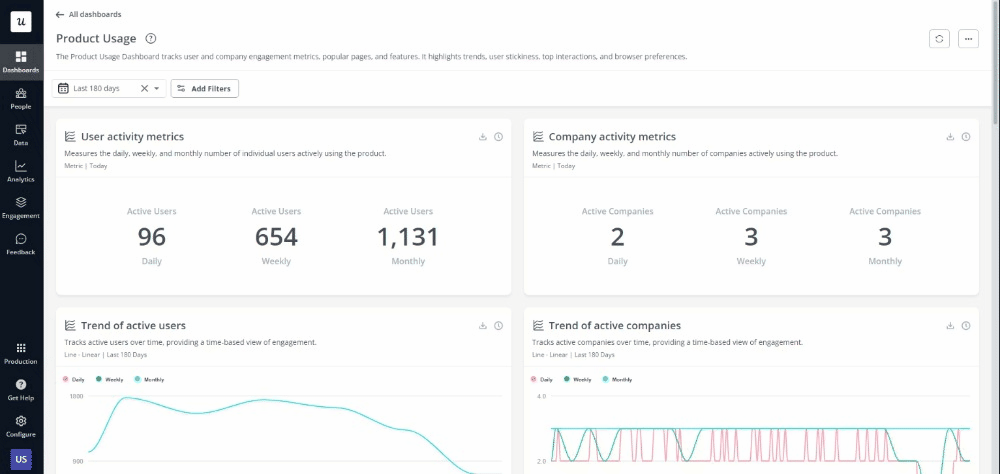![How to Become a Product Assistant [+Tools and Resources]](https://blog-static.userpilot.com/blog/wp-content/uploads/2024/08/How-to-Become-a-Product-Assistant-450x295.png)
Embarking on a career as a product assistant involves a combination of education, skills development, and practical experience.
Whether you’re just starting out or looking to transition into this role, understanding the key steps and requirements is essential.
This guide will provide you with a comprehensive overview of the path to becoming a successful product assistant.
Try Userpilot Now
See Why 1,000+ Teams Choose Userpilot

What is a product assistant?
A product assistant in the SaaS industry supports product managers by conducting market research, analyzing user feedback, and coordinating with cross-functional teams.
This role ensures the product meets user needs and business goals – requiring strong organizational, analytical, and communication skills. product assistants are essential in guiding product development and enhancing software solutions.
Product assistant’s main responsibilities
Here are the main responsibilities and duties of a product assistant:
- Conduct thorough market analysis to identify trends and user needs.
- Collect and interpret user feedback to guide product enhancements.
- Collaborate with development, marketing, and sales teams to ensure product alignment and successful launches.
- Develop and maintain comprehensive product documentation, including user manuals and feature descriptions.
- Organize and prioritize the product backlog, ensuring key features and improvements are addressed.
- Participate in agile ceremonies such as sprint planning and daily stand-ups.
- Monitor and report on key performance indicators to track product success and areas for improvement.
- Assist in the creation and maintenance of product roadmaps and release schedules.
- Support product managers in the execution of strategic projects and initiatives.
- Conduct competitive analysis to benchmark product performance and identify opportunities.
Product assistant career path
Here’s an overview of the typical career path for a product assistant in the SaaS industry:

Junior product assistant
As a junior product assistant, you’ll start by supporting senior product team members with basic tasks like market research, data analysis, and creating documentation. This role is your introduction to the world of product management, allowing you to learn the fundamentals and get familiar with key tools.
To progress, focus on mastering these basics, seek guidance from mentors, and show a willingness to take on additional responsibilities as you grow in your understanding of the product development process.
Product assistant
In the product assistant role, you’ll take on more substantial responsibilities, such as managing product backlogs, coordinating with cross-functional teams, and actively participating in sprint planning sessions.
Progressing in this role involves developing strong communication and organizational skills, taking the initiative to propose product improvements, and becoming an expert in your specific industry to add value to your team.
Associate product manager
As an associate product manager, you’ll start to own specific product features or projects, working closely with product managers to define strategies, create roadmaps, and measure success metrics.
To advance, demonstrate your leadership abilities, strengthen your relationships with development and design teams, and contribute meaningfully to broader product strategy discussions within the company.
Product manager
In the product manager role, you’ll be responsible for managing entire products or product lines, which includes setting the product vision, defining user personas, prioritizing features, and collaborating with various teams to deliver successful products.
Progression involves continuously improving your market and customer understanding, driving product success, and enhancing your leadership capabilities to guide your team effectively.
Product lead
As a product lead, you’ll oversee multiple products or lead a large product team, playing a key role in setting long-term product strategies and driving innovation within the company. In this advanced role, you’ll mentor junior product managers, align cross-functional teams, and influence the overall business strategy.
How to become a product assistant?
To become a product assistant, start by pursuing a Bachelor’s degree in business, marketing, computer science, or a related area. This will provide a solid foundation in both technical and business concepts.
Gaining relevant experience through internships or entry-level roles in product management, marketing, or project management is crucial for building practical skills and industry knowledge.
It’s also beneficial to familiarize yourself with agile methodologies and project management tools like Jira or Trello. Networking with professionals in the field and seeking mentorship can further guide your career path and open up opportunities in the SaaS industry.
What skills should a product assistant have?
A successful product assistant needs a blend of technical knowledge, analytical abilities, and strong communication skills. These skills enable them to support product managers effectively and contribute to the development and enhancement of software products.
Here are some essential skills for a product assistant:
- Analytical thinking: Ability to analyze data and user feedback to identify trends, issues, and opportunities for product improvement.
- Market research: Proficiency in conducting market analysis to understand user needs, industry trends, and competitive landscapes.
- Communication skills: Strong written and verbal communication to collaborate with cross-functional teams and document product information clearly.
- Project management: Skill in managing tasks, timelines, and priorities, especially within agile development frameworks.
- Technical proficiency: Familiarity with SaaS products, basic coding or software development concepts, and tools like Jira or Trello.
- Attention to detail: Keen eye for detail to ensure accuracy in product documentation and the execution of product plans.
- Problem-solving: Ability to identify potential issues early and suggest effective solutions during the product development process.
- Collaboration: Strong interpersonal skills to work effectively with various teams, including development, marketing, and customer support.
- Time management: Capability to juggle multiple tasks and meet deadlines in a fast-paced environment.
- Adaptability: Willingness to learn and adapt to new tools, methodologies, and changing product priorities.
Best certifications for product assistants
These certifications can enhance your credentials and provide you with a competitive edge in your career.
- Product Management Certification by Product School: Offers a comprehensive curriculum covering all aspects of product management, from ideation to launch.
- Certified Scrum Product Owner (CSPO) by Scrum Alliance: Focuses on agile product management, teaching you how to be an effective product owner within a Scrum framework.
- Pragmatic Institute Product Management Certification: Provides practical training on product management, with a focus on market-driven strategies and decision-making.
- PMHQ Product Manager Certification: A well-rounded certification covering key product management skills, tools, and methodologies.
- AIPMM Certified Product Manager (CPM): A globally recognized certification that covers the entire product lifecycle, from ideation to market launch, focusing on real-world product management skills.
Best resources for product assistants
To excel as a product assistant, it’s essential to leverage the best resources available across different mediums, including books, webinars, podcasts, blogs, and certifications. Below are some top resources to help you on your journey.
Best books for product assistants
These books offer valuable insights into product management and strategies for creating successful products.
- Inspired: How To Create Products Customers Love by Marty Cagan: Learn how to build products that customers truly love, with practical advice on product management and development.
- The Lean Product Playbook by Dan Olsen: A guide to creating successful products using lean principles, focusing on customer validation and iterative development.
- Product Management for Dummies by Brian Lawley and Pamela Schure: An accessible introduction to the fundamentals of product management, ideal for newcomers to the field.
- Cracking the PM Interview by Gayle Laakmann McDowell and Jackie Bavaro: A comprehensive resource for preparing for product management interviews, with tips on how to succeed in the role.
- Sprint: How to Solve Big Problems and Test New Ideas in Just Five Days by Jake Knapp: Discover the sprint process, a five-day method for solving problems and testing new ideas, essential for product development.
Best webinars for product assistants
These webinars provide up-to-date knowledge on industry trends and practical skills to enhance your role.
- Userpilot webinars: Covers topics like user onboarding, product adoption, and customer success, with practical insights from industry experts.
- Product School webinars: Regular webinars featuring industry leaders discussing various aspects of product management and development.
- Mind the Product webinars: Offers a wide range of webinars on product management topics, from strategy to execution, led by industry professionals.
- ProductPlan webinars: Provides webinars on product roadmapping, strategy, and prioritization, with expert guidance on best practices in product management.
- Mixpanel webinars: Provides webinars on product analytics, data-driven decision-making, and how to effectively measure and optimize user engagement.
Best blogs for product assistants
These blogs offer regularly updated content on product management best practices, case studies, and industry news.
- Userpilot blog: Provides actionable insights on product management, user onboarding, and customer success, with a focus on SaaS.
- Mind the Product blog: A comprehensive resource for product management news, trends, and best practices.
- Product Coalition blog: Features articles from a community of product managers, sharing tips, experiences, and industry knowledge.
- Product School blog: Offers educational content on various aspects of product management, including career tips and industry trends.
- Roman Pichler’s blog: Focuses on agile product management, with practical advice and tools for product assistants and managers.
Best podcasts for product assistants
These podcasts feature industry experts discussing product management tips, strategies, and real-world experiences.
- The Product Podcast by Product School: Interviews with top product leaders who share their insights and experiences in product management.
- This is Product Management: Explores the various aspects of product management through stories and interviews with industry experts.
- Rocketship.fm: Focuses on startup stories, product management, and growth, with lessons applicable to product assistants.
- The Product Experience by Mind the Product: Deep dives into the world of product management, with practical advice and experiences shared by industry professionals.
- The Product-Led Podcast: Discusses product-led growth, featuring interviews with product leaders on strategies for success.
Best tools for product assistants
As a product assistant, having the right tools at your disposal can make a significant difference in managing tasks, collaborating with teams, and making data-driven decisions. Here are some of the best tools to help you excel in your role:
- Best tool for user onboarding and adoption – Userpilot: Userpilot is an intuitive product adoption platform that allows you to create in-app experiences and guides without any coding. It helps you enhance user onboarding and improve feature adoption, making it essential for driving product success.
- Best tool for project management – Jira: Jira is a powerful project management tool designed for agile teams. It enables you to track tasks, manage backlogs, and monitor sprint progress, ensuring that projects stay on track.
- Best tool for task organization – Trello: Trello is a flexible, easy-to-use tool for organizing tasks using boards, lists, and cards. It’s perfect for visualizing workflows and keeping your to-do list in order.
- Best tool for team collaboration – Confluence: Confluence is a collaborative workspace where teams can create, share, and discuss projects. It’s great for documenting product requirements and storing all project-related information in one place.
- Best tool for customer support – Zendesk: Zendesk is a leading customer support tool that helps manage customer queries and issues. It’s ideal for ensuring customer satisfaction and keeping track of support tickets.
- Best tool for customer success management – ChurnZero: ChurnZero is a customer success platform designed to help you reduce churn and increase customer retention. It offers insights into customer behavior and automates outreach based on user data.
- Best tool for UX/UI design – Figma: Figma is a popular UX/UI design tool that allows teams to collaborate in real-time. It’s perfect for creating wireframes, prototypes, and high-fidelity designs that align with user needs.
- Best tool for product documentation – Notion: Notion is a versatile workspace that combines note-taking, task management, and database functionalities. It’s great for organizing product documentation and keeping everything in one accessible place.
- Best tool for customer relationship management – HubSpot Service Hub: HubSpot Service Hub is a comprehensive tool for managing customer relationships and support. It integrates with other HubSpot products, providing a seamless experience for customer communication.
- Best tool for data visualization – Tableau: Tableau is a leading data analytics tool that allows you to visualize data through interactive dashboards. It’s ideal for analyzing product metrics and making data-driven decisions.
Product assistant FAQs
Here are some frequently asked questions related to product assistants:
- What are the roles of a production assistant?
- A production assistant supports the production team with logistical tasks and scheduling. They manage equipment, coordinate with departments, and ensure smooth production processes.
- What is the role of a product manager assistant?
- A product manager assistant conducts market research and analyzes user feedback for the product manager. They also assist in managing product backlogs, documenting requirements, and coordinating with cross-functional teams.
- What is the role of a product control assistant?
- A product control assistant oversees quality control processes during product development. They ensure products meet standards and regulations and identify areas for quality improvement.
- What is a product marketing assistant?
- A product marketing assistant assists in developing and executing marketing strategies for products. They support promotional activities, market research, and content creation to boost product visibility and sales.
Conclusion
Becoming a successful product assistant requires dedication, continuous learning, and a proactive approach to developing relevant skills.
By following the outlined steps and leveraging the resources available, you can effectively navigate your career path and achieve your professional goals.
We hope this guide has provided you with valuable insights and practical advice to help you on your journey to becoming a proficient and impactful product assistant!
Looking into tools for product assistants? Userpilot is an all-in-one product platform with engagement features and powerful analytics capabilities. Book a demo to see it in action!








